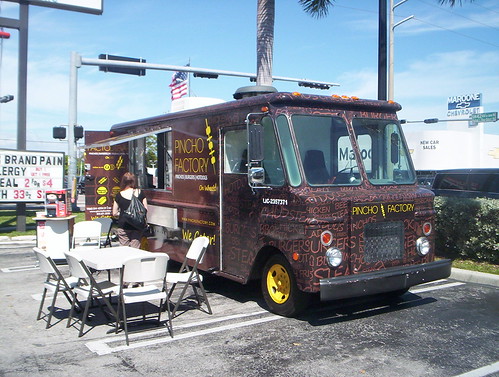Food Truck Maintenance: What to Know About Keeping Your Equipment in Shape
When you rely on a food truck to meet your customers’ needs, you have to make sure that you keep your equipment in great shape. Follow these food truck maintenance tips to make sure you can always travel to your customers with fresh, delicious foods that meet safety standards.
Your Truck is Top Priority

Image via Flickr by Phillip Pessar
You want all of your equipment to work perfectly so you can deliver the best food to your customers, but it’s most important that you keep your truck in excellent condition. Without your truck, you can’t sell food to your customers.
A food truck business without a working truck is nothing more than a tiny restaurant without customers.
Follow a standard vehicle maintenance checklist so your truck works when you need it. Your checklist should include:
- Changing the oil about every 5,000 miles
- Rotating the tires every 5,000 miles and making sure that they have the proper PSI
- Checking all of your fluid levels (don’t rely on your dashboard to tell you when you’re low)
You also need to make sure that you have all of the quick repair items that you need if you break down on your way to your usual corner or an event. That means having:
- A spare tire and the equipment you need to change tires
- Jumper cables in case your battery dies
- A tool kit for quick engine adjustments
- An extra quart of oil just in case you get a leak
- Any other spare parts that you absolutely need to serve your customers
If you have any questions about vehicle maintenance, start by reading the owner’s manual. Those who really depend on their trucks, however, should also learn some basic maintenance skills that will keep their trucks on the road. You never want to miss a day of business because of a mechanical malfunction!
Keep Your Generator in Perfect Condition
Without a generator, you don’t have electricity. That means your refrigerator, oven, and grill won’t work. It probably also means that city inspectors will shut you down because you can’t meet regulations (this depends on what you sell and where you sell it).
Keeping a generator in perfect condition can pose a challenge to food vendors. Few people know much about generator maintenance. Even fewer have the time and resources to do it properly.
That’s why it often makes sense to have your mechanic take care of the generator. Even relatively simple chores like changing the oil can become a hassle when you consider all of the environmental regulations.
Talk to your mechanic to decide what type of maintenance schedule you need for your generator. If you operate a food truck, you should already know a mechanic who will give you truthful information and honest price quotes.
If you insist on doing the maintenance yourself, then you should learn how to:
- Check the alternator for debris
- Measure the battery’s voltage
- Change oil and filters
- Inspect the fuel pump, turbocharger, injectors, and automatic voltage regulator.
Do Maintenance for All of Your Equipment
You can probably get by for a day with one malfunctioning piece of equipment. But that’s difficult and you set yourself up for fines that make it even harder for you to earn a profit. That’s why you need to know how to maintain your equipment, including your refrigerator, freezer, and stove.
How you maintain these items depends on the models that you have. It’s pretty easy to keep an electric stove top in good shape. Keeping it clean and safe is about all that you can do. If you have a gas-powered stove top, though, you’ll also need to:
- Make sure your tubes and lines are clean so fuel can pass through them efficiently
- Check connections so you can prevent dangerous leaks
- Remove debris that can prevent efficient gas flow
When it comes to maintaining a fridge or freezer, filters are your main concern. This equipment relies on fans and condensers to create low temperatures. Dirty filters will force the equipment to work harder (or stop working). At best, that means you’ll spend more money on fuel.
Change those filters regularly so you don’t have to worry about them. If you use grease in your food truck, then you’ll likely have to change them more often since grease can clog the filters quickly.
Avoid Problems By Choosing Reliable Equipment
Starting a food truck is hard. Making one profitable is even harder. You can use all of the Kickstarter pages that you want, but you’ll only build a successful business by making smart decisions.
For many mobile food vendors, that means choosing reliable equipment.
Buying cheap equipment will make your first year or two look more successful than they really are. Skimping on startup costs might save you a few dollars (or even a few thousand dollars) at first, but it will usually come back to haunt you.
Before buying equipment, make sure you do your research. Talk to other food vendors in the area. Yeah, competition is stiff, but most cities have tightly knit food truck communities of businesspersons who want to help each other thrive.
You should also search the Internet for reviews before investing in equipment. If you see a lot of bad reviews, avoid the item even if it looks like it will save you a boatload of money. Nothing is cheap when you have to buy kitchen equipment.
Cheap items only save you money when they work well for years. Most of them become a drain that add to your yearly expenses. Far too many food truck operators and restaurants have wasted money on cheap, faulty equipment. Eventually, you will end up buying something that works well. You might as well go ahead and invest in that equipment now instead of wasting money on cheap imitations.
How long have you worked in the food truck industry? Have you ever experienced problems because you didn’t keep up with maintenance? Share your experiences below so that younger entrepreneurs don’t have to repeat your mistakes!
